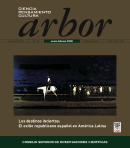The 1895 War in Cuba and its consequences
DOI:
https://doi.org/10.3989/arbor.2009.i735.273Keywords:
Cuban War of Independence (1895-1898), José Martí, Antonio Cánovas del Castillo, Cuban autonomy and independence leaders, Fitzhugh Lee, U. S. consul in Havana, Spanish-American War (1898)Abstract
On 24 February 1895 most people in Cuba did not want a war of independence, because reforms for the island had been approved by the Madrid parliament. The reaction to the insurrection begun in Cuba on that date by the Spanish government of Antonio Cánovas del Castillo was to treat all Cubans as rebels. In 1896 Cánovas sent general Weyler to Cuba, and by the end of 1897 he had stopped the advances of the insurrectionists, but the forced removal of the rural population into urban settlements that he decreed in order to prevent their assistance to the insurgents, led to thousands of deaths by hunger and disease, and in the United States public opinion began to clamor for intervention in Cuba to expel Spain, and this was advised by people like the Consul General in Havana, Fitzhugh Lee. The war begun in 1895 for the independence of Cuba had as consecuences the war of the United States with Spain in 1898 and its transformation into a world power with the colonies that it took from Spain in Asia and America.
Downloads
Download data is not yet available.
Downloads
Published
2009-02-28
How to Cite
Tarragó, R. E. (2009). The 1895 War in Cuba and its consequences. Arbor, 185(735), 215–229. https://doi.org/10.3989/arbor.2009.i735.273
Issue
Section
Articles
License
Copyright (c) 2009 Consejo Superior de Investigaciones Científicas (CSIC)

This work is licensed under a Creative Commons Attribution 4.0 International License.
© CSIC. Manuscripts published in both the printed and online versions of this Journal are the property of Consejo Superior de Investigaciones Científicas, and quoting this source is a requirement for any partial or full reproduction.All contents of this electronic edition, except where otherwise noted, are distributed under a “Creative Commons Attribution 4.0 International” (CC BY 4.0) License. You may read here the basic information and the legal text of the license. The indication of the CC BY 4.0 License must be expressly stated in this way when necessary.
Self-archiving in repositories, personal webpages or similar, of any version other than the published by the Editor, is not allowed.















